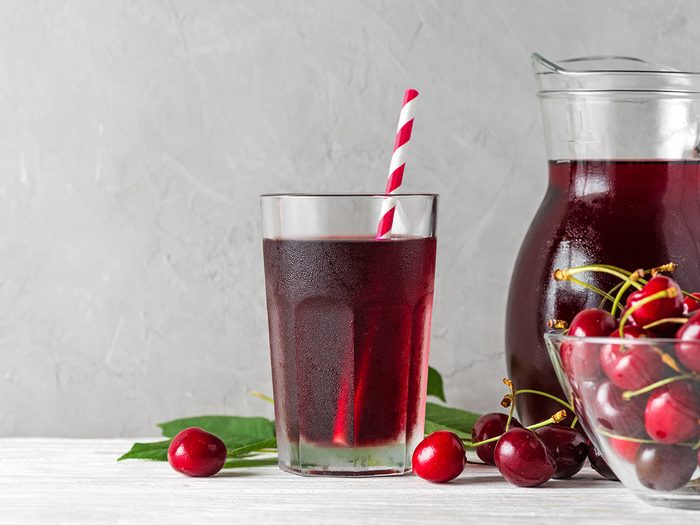Can Cherry Juice Really Help With Arthritis?

Tart cherry juice is becoming a popular home remedy for relieving arthritis pain, but is there any evidence it actually works? Here's what we found out.
Life with arthritis isn’t exactly a bowl of cherries—affecting one in five Canadians, it’s a leading cause of chronic pain and disability. Medications can help, but come with possible side effects. Enter the sour cherry—also known as prunus cerasus—a crimson red tree berry that’s supposedly bursting with naturally healing juice. Could drinking a couple of glasses a day of this suddenly trendy elixir relieve joint pain? We shook the (cherry) tree to find out the evidence.
Cherry Juice Benefits
Aside from being delicious baked into pies, sour cherries are rich in anthocyanins, the molecules of blue-red pigment that give the fruit their rich colour. Also found in blueberries, pomegranates and purple cauliflower, anthocyanins are a type of flavonoid, a beneficial plant compound with antioxidant properties. This means they protect your body’s cells against free radicals, potentially harmful molecules that contribute to heart disease, cancer, arthritis and other illnesses. Excessive levels of free radicals—which can be caused by too much sugar, fat, alcohol, or exposure to environmental pollutants—create an imbalance called oxidative stress, which causes the inflammation that worsens osteoarthritis and other diseases.
Research supports the idea that a diet rich in antioxidants can prevent and counteract this inflammation. Consuming plenty of fruits, vegetables, and whole grains—sources of free radical-fighting nutrients like vitamins C and E, carotenoids, selenium, zinc, and phenolic compounds (including anthocyanins)—is associated with greater protection from a range of aging-related diseases.
Cherry Juice for Arthritis Pain
When it comes to arthritis, the first line of defense against arthritis pain has traditionally been over-the-counter pain relievers like acetaminophen and non-steroidal anti-inflammatories (NSAIDs), but the latter especially have been associated with serious side effects, such as gastrointestinal bleeding and ulcers. Luckily, research into non-pharmaceutical therapies is gaining in popularity.
Although no large-scale studies have yet been able to confirm the benefit of antioxidants like anthocyanins, several small but promising studies have pointed to cherry juice as an effective inflammation reducer and pain reliever. In 2003, researchers at Johns Hopkins University found that rats that had been artificially induced with arthritis showed less signs of pain and inflammation after being fed anthocyanins extracted from tart cherries, compared to a control group fed with saline. In 2012, researchers at Oregon Health & Science University had a group of 20 women aged 40 to 70, all suffering from inflammatory osteoarthritis, drink about 20 ounces of tart cherry juice a day. After three weeks, their blood showed a 14 per cent reduction in C-reactive protein (CRP), a biomarker of inflammation, compared to a placebo control group, and reported lower levels of arthritis pain. A similar study published in Osteoarthritis and Cartilage in 2013 demonstrated a 23 per cent reduction in CRP.
Additional Cherry Juice Benefits
As it turns out, arthritis relief may not be the only reason to wash down your breakfast with a glass of cherry juice. Containing plenty of potassium, an electrolyte that aids muscle function, tart cherry juice is also an excellent post-workout recovery drink, helping to reduce muscle pain and stiffness.
The flavonoids in cherry juice are also thought to be immune modulators, meaning they can potentially ease the symptoms of chronic inflammatory bowel disease, Crohn’s, and ulcerative colitis. Tart cherry anthocyanins also slowed the growth of cancer cells in a study on colon cancer.
Cherry juice—whether tart or sweet—also contains two sleep-inducing chemicals, melatonin and tryptophan, and drinking one cup twice a day for two weeks led to longer and better sleep for older adults who suffer from insomnia, according to one study. The same amount of juice also seemed to improve cognitive function in seniors after 12 weeks of use, leading to higher scores on memory tests.
Thinking of adding some tart cherry to your day? Make sure you buy the kind with no sugar added, and avoid “cocktails” that contain sweeteners and preservatives. Before long, you’ll be embracing its sour kick—and hopefully putting a little more spring in your step.
Now that you’re familiar with these cherry juice benefits, find out if shark cartilage really helps with arthritis.






